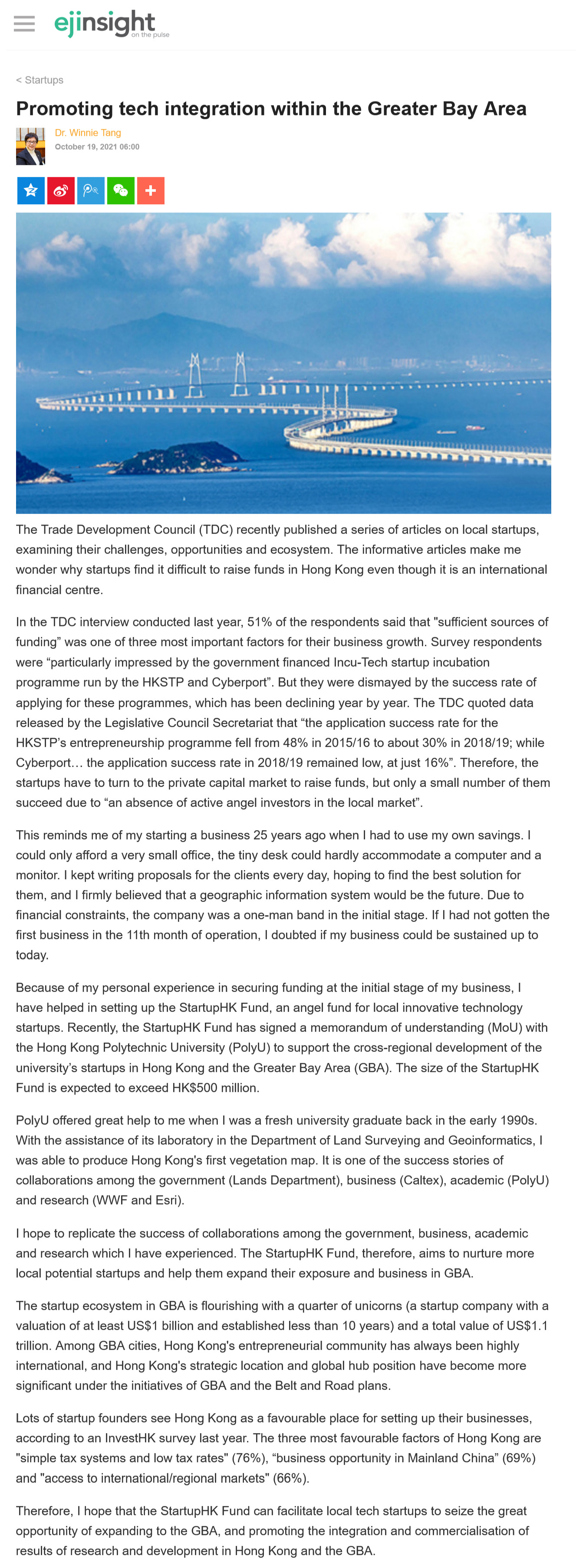網上版請按此

Promoting tech integration within the Greater Bay Area
The Trade Development Council (TDC) recently published a series of articles on local startups, examining their challenges, opportunities and ecosystem. The informative articles make me wonder why startups find it difficult to raise funds in Hong Kong even though it is an international financial centre.
In the TDC interview conducted last year, 51% of the respondents said that "sufficient sources of funding” was one of three most important factors for their business growth. Survey respondents were "particularly impressed by the government financed Incu-Tech startup incubation programme run by the HKSTP and Cyberport". But they were dismayed by the success rate of applying for these programmes, which has been declining year by year. The TDC quoted data released by the Legislative Council Secretariat that "the application success rate for the HKSTP's entrepreneurship programme fell from 48% in 2015/16 to about 30% in 2018/19; while Cyberport… the application success rate in 2018/19 remained low, at just 16%". Therefore, the startups have to turn to the private capital market to raise funds, but only a small number of them succeed due to "an absence of active angel investors in the local market".
This reminds me of my starting a business 25 years ago when I had to use my own savings. I could only afford a very small office, the tiny desk could hardly accommodate a computer and a monitor. I kept writing proposals for the clients every day, hoping to find the best solution for them, and I firmly believed that a geographic information system would be the future. Due to financial constraints, the company was a one-man band in the initial stage. If I had not gotten the first business in the 11th month of operation, I doubted if my business could be sustained up to today.
Because of my personal experience in securing funding at the initial stage of my business, I have helped in setting up the StartupHK Fund, an angel fund for local innovative technology startups. Recently, the StartupHK Fund has signed a memorandum of understanding (MoU) with the Hong Kong Polytechnic University (PolyU) to support the cross-regional development of the university's startups in Hong Kong and the Greater Bay Area (GBA). The size of the StartupHK Fund is expected to exceed HK$500 million.
PolyU offered great help to me when I was a fresh university graduate back in the early 1990s. With the assistance of its laboratory in the Department of Land Surveying and Geoinformatics, I was able to produce Hong Kong's first vegetation map. It is one of the success stories of collaborations among the government (Lands Department), business (Caltex), academic (PolyU) and research (WWF and Esri).
I hope to replicate the success of collaborations among the government, business, academic and research which I have experienced. The StartupHK Fund, therefore, aims to nurture more local potential startups and help them expand their exposure and business in GBA.
The startup ecosystem in GBA is flourishing with a quarter of unicorns (a startup company with a valuation of at least US$1 billion and established less than 10 years) and a total value of US$1.1 trillion. Among GBA cities, Hong Kong's entrepreneurial community has always been highly international, and Hong Kong's strategic location and global hub position have become more significant under the initiatives of GBA and the Belt and Road plans.
Lots of startup founders see Hong Kong as a favourable place for setting up their businesses, according to an InvestHK survey last year. The three most favourable factors of Hong Kong are "simple tax systems and low tax rates" (76%), "business opportunity in Mainland China" (69%) and "access to international/regional markets" (66%).
Therefore, I hope that the StartupHK Fund can facilitate local tech startups to seize the great opportunity of expanding to the GBA, and promoting the integration and commercialisation of results of research and development in Hong Kong and the GBA.
Dr. Winnie Tang
Adjunct Professor, Department of Computer Science, Faculty of Engineering; Department of Geography, Faculty of Social Sciences; and Faculty of Architecture, The University of Hong Kong